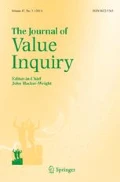Notes
Bernard Williams, “Human Rights and Relativism,” in Geoffrey Hawthorn, ed., In the Beginning Was the Deed: Realism and Moralism in Political Argument (Princeton, N.J.: Princeton University Press, 2005), p. 65.
Ibid., p. 66.
Williams, “Realism and Moralism in Political Theory,” in Hawthorn, op. cit., p. 9.
See Williams, Morality: An Introduction to Ethics (New York: Harper & Row, 1972), p. 22; see also, Williams, “The Truth in Relativism,” in Moral Luck: Philosophical Papers 1973–1980 (Cambridge, England: Cambridge University Press, 1981), p. 132; and Williams, “Relativism and Reflection,” in Ethics and The Limits of Philosophy (London: Fontana Press, 1985), pp. 159, 219, n.2.
See Thomas Magnell, "Conflicts to Face When Values Conflict,” Journal of Value Inquiry vol. 41, no. 1, 2007, pp. 1–13, esp. pp. 2–5.
Williams, “Philosophy as a Humanistic Discipline,” in A. W. Moore, ed., Philosophy as a Humanistic Discipline (Princeton, N.J.: Princeton University Press, 2006), pp. 190–191.
See Williams, “Human Rights and Relativism,” p. 66; see also Carol Rovane, "Did Williams Find the Truth in Relativism?”, in Daniel Callcut, ed., Reading Bernard Williams (London: Routledge, 2009), pp. 46 & 54.
See Christopher Hookway, “Fallibilism and Objectivity: Science and Ethics,” in J.E.J. Altham and Ross Harrison, ed., World, Mind, and Ethics: Essays on the Ethical Philosophy of Bernard Williams (Cambridge, England: Cambridge University Press, 1995), pp. 46–67.
See Williams, “Realism and Moralism in Political Theory,” in Hawthorn, op. cit., p. 8; see also Williams “Toleration, A Political or Moral Question?”, in Williams, Philosophy as a Humanistic Discipline, p. 134.
See Williams, Philosophy as a Humanistic Discipline, p. 193.
Williams, Ethics and the Limits of Philosophy, p. 163.
See Alasdair MacIntyre, “Rationality and the Explanation of Action,” in MacIntyre, Against the Self-Images of the Age (Notre Dame, Ind.: University of Notre Dame Press, 1978), pp. 244–259.
Williams, Truth and Truthfulness (Princeton, N.J.: Princeton University Press, 2002), p. 20; also see Roger Paden, “Bernard Williams, Truth and Truthfulness: An Essay in Genealogy,” Journal of Value Inquiry, vol. 37, no. 4, 2003, pp. 565–569.
Williams, ibid., p. 35.
See Edward H. Levi, An Introduction to Legal Reasoning (Chicago: University of Chicago Press, 1949) and Cass Sunstein, Legal Reasoning and Political Conflict (Oxford; New York: Oxford University Press, 1996).
See Williams, Ethics and the Limits of Philosophy, pp. 96–97.
Williams, “Realism and Moralism in Political Theory,” in Hawthorn, op. cit., p. 3.
Ibid., p. 8.
See Judith Shklar, “The Liberalism of Fear,” in Nancy Rosenblum, ed., Liberalism and The Moral Life (Cambridge, Mass.: Harvard University Press, 1989), pp. 21–38.
Williams, “The Liberalism of Fear,” in Hawthorn, op. cit., p. 61.
See John McDowell, “Virtue and Reason,” The Monist, vol. 62, no. 3, 1979, pp. 331–350; and McDowell, Mind, Value and Reality (Cambridge, Mass.: Harvard University Press, 1998); see also Jonathan Dancy, Moral Reasons (Oxford: Blackwell, 1993); and Brad Hooker and Margaret Little, ed., Moral Particularism (Oxford: Oxford University Press, 2000).
See Williams, Ethics and the Limits of Philosophy, pp. 129–130 & 140–145.
See Williams, "The Idea of Equality," in Hawthorn, op. cit., p. 107.
Williams, Shame and Necessity (Berkley, Calif.: University of California Press, 1993), p. 122.
See Williams, “A Mistrustful Animal: An Interview with Bernard Williams,” The Harvard Review of Philosophy, vol. XII, 2004, pp. 88–89.
See Williams, “Moral Luck,” in Williams, Moral Luck, pp. 20–39.
See Williams, “Internal and External Reasons,” in Williams, Moral Luck, pp. 101–113; see also John Skorupski, “Internal Reasons and the Scope of Blame,” in Alan Thomas, ed., Bernard Williams (Cambridge, England: Cambridge University Press, 2007), pp. 73–103; and Derek Parfit, On What Matters, vol. II (Oxford: Oxford University Press, 2011), pp. 269–288.
See Williams, in Myles Burnyeat, ed., The Sense of the Past: Essays in The History of Philosophy (Princeton, N.J.: Princeton University Press, 2006), p. 59.
I am grateful to Thomas Magnell, the Editor-in-Chief of the Journal of Value Inquiry and to the anonymous referees for many improvements to this article as initially submitted, and to Daniel Kofman for comments on an earlier version.
Author information
Authors and Affiliations
Corresponding author
Rights and permissions
About this article
Cite this article
Aronovitch, H. How Liberals Can Explain the Moral Errors of Past Eras and Answer Bernard Williams. J Value Inquiry 46, 339–351 (2012). https://doi.org/10.1007/s10790-012-9347-8
Published:
Issue Date:
DOI: https://doi.org/10.1007/s10790-012-9347-8

